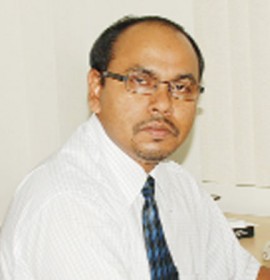This newspaper learnt earlier this week that Chairman of the Private Sector Commission, Captain Gerry Gouveia was out of the country and that the private sector was yet to convene its customary post-budget forum to study the document. The only available senior official from a major private sector organization – President of the Georgetown Chamber of Commerce and Industry, Chandradat Chintamani – told Stabroek Business that he was unsure as to when such a forum would be convened.
Chintamani, however, agreed to make some general comments on what he described as “issues in which the private sector was interested”. He said he believed that there was “an expectation” on the part of the country’s work force that some adjustment would have been made to the tax threshold. He said, however, that issues of taxation were being addressed within the framework of a complete review of the existing tax regime. He said that the first draft of the review had already been seen by the private sector and that a second draft was due following another round of intervention by consultants. Asked whether the private sector was not of the view that tax reform was moving at a ponderous pace, Chintamani told Stabroek Business that he believed that much of the “hard work” had been completed and that the consultants were due in Guyana during the first quarter of 2010.
Chintamani told Stabroek Business that the private sector would also wish to see a hastening of legislation aimed at creating an appropriate lending mechanism from which the small business sector could benefit. “The small business sector continues to depend on competitive borrowing. The sector cannot compete at those high rates of interest. At the same time we cannot afford to neglect the growth of the small business sector. Big businesses are becoming more and more technology intensive and it is the small business sector that is generating employment.”

The GCCI President said that his optimism that the manufacturing sector could rebound from a difficult 2009 was tempered by “its uncompetitive condition resulting chiefly from high electricity costs. If the manufacturing sector is to grow we must see signs of progress in the hydro-generation sector.”
Meanwhile Chintamani told Stabroek Business that the Chamber was supportive of Banks DIH Ltd Chairman, Clifford Reis’ call for more to be done to address the issue of cross-border smuggling. “I suppose one can say that we are faced with both legal smuggling and illegal smuggling. By legal smuggling I mean under-invoicing and of course there is wholesale smuggling. Both are illegalities and both affect the business community far beyond alcohol and tobacco.
Chintamani told Stabroek Business that he believed that the authorities in Guyana could assume a more pro-active posture on the issue of smuggling which should include collaboration among the various stakeholder agencies in the region. The GCCI President said that he believed that large volumes of goods that enter Guyana illegally are ferried through the Suriname Freeport at Nickerie. “I believe that we can begin to explore the possibility of collaborating with the customs authorities at Nickerie in order to secure information on goods heading for Guyana. At the moment the authorities there tend not to pay too much attention to goods that are simply passing through Nickerie en route to Guyana. Perhaps we may even be able to get them to agree to a system where they inform us of goods at Nickerie that are bound for Guyana and the authorities here move to collect the duties on those goods even before they arrive here.”





